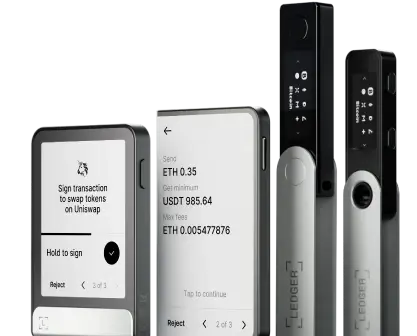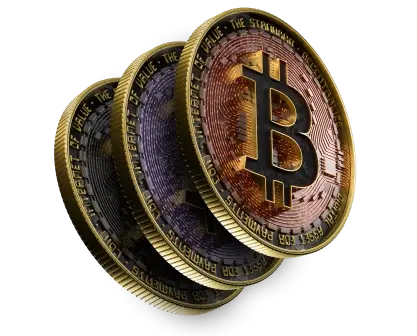Thought leadership | 07/01/2020
Buy vs Own: Do You Really Own the Crypto You Just Bought?

For the past two weeks, you’ve been spending hours on the internet exploring the meanders of the crypto world, confronting yourself with cryptic jargon such as sats, shills, pump and dump. Reading white papers (or at least trying to), devouring exchange reviews and comparisons, not stopping talking about it until turning your friends off and dreaming of the day when you’ll finally own some. But that day didn’t come…
When did I screw up?
“Deeply convinced by crypto and its revolutionary potential, you decided to buy the asset you spotted during the two-weeks search. You also decided to opt for that specific exchange for its very low fees. That night was the night: you signed up for an account, using your email address. You chose your username and your most secure password. Then you went through the process of verifying your account: you sent a picture of your ID, provided your name, date of birth, country, physical address and phone number. Account validated! You funded it via bank transfer. Waited a bit… Your fiat hit your account! You were finally ready to dive in! Which you did right away. You entered the sum of money you wanted to convert. Validation. Done! You bought your assets! You were so excited that you couldn’t resist telling all your friends about it. You spent the rest of your evening thinking about what you could do now and your potential next moves as a true crypto owner. You went to bed with crypto dreams, leaving your freshly bought token on the exchange…
What you weren’t expecting is that the next day that exchange got hacked. You received the news while waking up. Scared, you rushed to check it out, thinking it was a joke. You tried to log in. The exchange was under maintenance. You had completely lost control of your assets and could do nothing but wait. Which you did. You stressed all day. At night, you realized you had lost everything, without even a chance or the power to do anything about it…”
These things only happen to other people those who lose control
Buying and leaving your assets with a third party (i.e. an exchange for example) means entrusting them to a third party. In other words, it means you are not fully in control of your assets, in terms of actions as you can’t do whatever you want with them, ownership (as you don’t really own them) and security (as they are vulnerable to hacks).
First, each time you want to interact with your crypto, you’re basically asking the exchange for permission to have access to it. Similar to a bank, you will need to wait till they process and approve your request. While the power of crypto lies in its decentralization and individual empowerment, leaving your assets on an exchange – or other online platforms – is like putting back a man in the middle. Especially since you’re not the real person in control of your funds. For instance, when you want to perform an action such as a transfer, the request goes through the exchange or the platform where you store your assets. You can be blocked from making a transfer or asked questions as to the purpose of it. Some limitations can also prevent you from sending over a defined amount of crypto, or your transfer can simply be denied. Besides, the third party platform could restrict your freedom of choice in terms of services or options, by simply not giving it to you. While most exchanges have a staking offer – a way of being rewarded for participating in the network ecosystem – they may tend to impose on you some choices, for example to which entity you may delegate your vote to for staking purposes. On the other hand,with Ledger Live you can choose whichever validator you want to delegate your stake to based on your evaluation of key criteria (percentage gain, reliability, validator values, opinions etc…).
In short, leaving your crypto assets on an exchange means letting them decide how your crypto is managed, according to their rules, not yours. It is giving the control of your assets to a third party, which is in control.
Buying and keeping your coins on an exchange means not controlling them
When you buy your crypto through an exchange and just leave them on it, rely on the exchange to give it back to you when you ask for it. You wouldn’t have full control over them either. It’s actually the exchange that effectively is in control of your crypto because it owns the private keys to your funds.
What are private keys?
When you own 1 dollar, you either physically own 1 dollar in fiat currency, or you own 1 dollar on your bank account, with the bank being the intermediary to officially certify you actually have it (and to convert it in fiat whenever you need to). When talking about cryptocurrencies, there is no physical equivalent such as fiat, gold, diamond or work of art. It’s fully digital. To ensure trust among the network, cryptocurrencies work based on private and public keys. While your “private key” is yours and unlocks the right for you to spend the associated cryptocurrencies (and should therefore remain private), the public key is a public address where all users in the network can send cryptocurrencies. Conceptually speaking, if your private key were your bank account password, your public key would be your bank account number, such as an IBAN. Private and public keys together form the crypto system that in a sense virtually creates “tangibility” in the transactions, reporting in the code any transaction in an encrypted and immutable way. In other words, these keys prove that a spent transaction was indeed signed by the owner of the funds, and was not forged.
Therefore, when you own cryptocurrencies, what you really own is a “private key.” This gives rise to the saying: “Not your keys, Not your crypto”. This famous statement in the crypto community summarizes the issues with exchanges since by leaving your coins on an exchange, they own your private keys. Therefore, they also control your crypto.
If I don’t control my crypto, what do I actually have?
Keeping your crypto on online platforms is effectively equal to having an “IOU” (I owe you), not the crypto itself. A so-called IOU refers to “an informal document that acknowledges a debt one party owes to another”. Since they are informal, IOUs do not include any legal commitment about paying the debt or payment deadlines. “In essence, IOUs are nothing more than casual notes that people create in order to remind them they need to pay a debt in a future date” – Binance Academy.
On top of the lack of control of your crypto, the last – but not least – big risk of leaving your asset on an online platform is security. Exchanges are centralized and intermediary platforms designed to facilitate transactions. They’re not banks or vaults. If something bad happens to the exchange – a hack, scam, lack of liquidity… – and your crypto is gone. In most cases it does not have any legal obligation to refund your loss, while banks do have it (when the security breach is on their side). Besides, anyone who can figure out your login details would be able to access and steal your Bitcoins. You are not only vulnerable to the exchange hacks but also to your account being hacked. Unfortunately, these things happen all the time all over the world. To give you an idea, here is a complete and updated list of cryptocurrency exchange hacks, including the verified losses in coins, fiat and data. Despite the efforts made by exchange to reinforce their security, the number of hacks seem to keep increasing. In 2018, Coindesk announced “a record-breaking year for exchange hacks and funds lost”. It included the Tokyo-based Coincheck hack, victim of the biggest hack in the history at the time, losing an estimated $500 million worth of cryptocurrencies. In 2019, it was Cointelegraph‘s turn to report a new record of twelve exchange hacks over the year, with over $292 million and over 500,000 cases of customer’s personal data being stolen.
While the exact number of overall victims from both exchanges and individual accounts hacks is unknown, exchanges being susceptible to hacks is certain. As centralized intermediaries connected to the internet holding vast sums of crypto, non-secure exchanges and other online platforms are an “easier and more alluring target” for thefts. That’s why taking back control of your crypto assets is very important to correctly protect them.
How to take back control of my crypto assets?
You got it now: by leaving your crypto on an exchange, you don’t control your private keys – thus you don’t control your cryptos – and as such you don’t have any control over your own funds. The only way to take back control is to ensure they are secure on your own, independently from a third party, rather than outsourcing their security and storage to a third party. How? By using a hardware wallet like the Ledger Nano X and Ledger Nano S.
Hardware wallets are physical devices used for storing your private key in an encrypted, offline environment. It means:
1) your assets are kept securely away from anyone who’s not the primary user
2) you ensure ownership and full control of your assets as you are the only one in charge of your money (no third party involved)
3) they won’t be vulnerable to online hacks or cyberattacks unlike exchanges and other hot wallets.
In short, storing your crypto investments on a Ledger hardware wallet ensures that you actually own the asset and have full control on it in a secure way.
If we go back to the whole buying process you went through with the exchange, a last yet crucial step was missing: the secure storage. As you control your funds when you own your keys, you should transfer them to your hardware wallet to actually own and secure them. To ease the process and help crypto owners to take this final, vital step, Ledger’s team recently added a new Buy feature in Ledger Live. Thanks to the Coinify integration, the transaction is simpler and once you bought your favorite crypto through Ledger Live, it will automatically be sent by Coinify to the safety of your hardware wallet. Taking back control and becoming a true owner of your money has never been this easy.
The content you are reading is for informational purpose only. Nothing contained in this article constitutes investment advice or a solicitation or recommendation to buy or sell crypto-assets.
Before using the services, please educate yourself to make informed decisions. Crypto assets are volatile. Carefully evaluate your goals and the financial risk you are willing to take. Please be aware that Ledger does not provide financial, tax, or legal advice. Decisions to perform operations involving crypto assets should be taken on your own or rely on opinions of reliable and qualified experts.





























